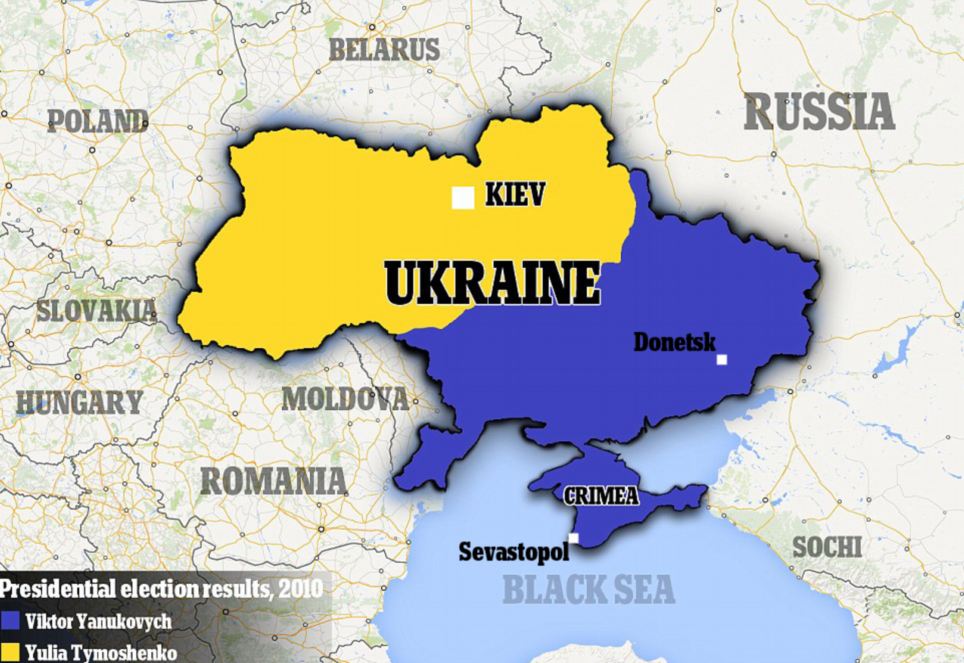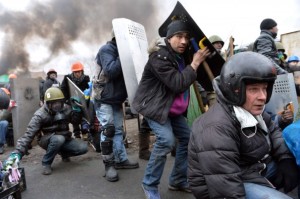 Tensions that were simmering between anti-government protesters and riot police for the past three months finally erupted into revolutionary conflict in Ukraine last week.
Tensions that were simmering between anti-government protesters and riot police for the past three months finally erupted into revolutionary conflict in Ukraine last week.
Street clashes leave at least 26 people, including 10 police officers, dead and hundreds injured. The violence begins when protesters attack police lines and set fires outside parliament after it stalls on taking up a constitutional reform to limit presidential powers.
(The Associated Press, February 20, 2014)
It is impossible to fully appreciate these revolutionary developments, and what they portend, without knowing a fair amount about developments over the past decade that led inexorably to them.
And, even if I do say so myself, I don’t think you can do much better in this respect than to read the commentaries I’ve written on Ukraine. Better still, I wrote one just three months ago that should serve as a CliffNotes-like primer.
After reprising it below, I’ll give my take on why last week’s overthrow of pro-Russian President Viktor Yanukovych by pro-Western protesters is no cause for celebration.
With that, here is “Ukraine’s Never-Ending Europe Spring,” (December 3, 2013) for your edification:
______________________
I’m on record hailing Ukrainians as my favorite ex-communists. Alas, I’m also on record lamenting that, ever since their triumphal Orange Revolution in 2005, they have done nothing but trample all over my hopes for the political development of their country.
Just two years after that revolution, which was supposed to set them on an inexorable path towards a thriving democracy, it became agonizingly clear that Ukrainians are more divided among themselves than they ever were with the Russians who once lorded over them.
No American politician could have anticipated the obsession fractious Ukrainians evidently developed for elections after their split from the former Soviet Union. After all, Sunday’s national poll was the third in three years, which puts the Ukrainians on track to make the Italians’ promiscuous penchant for changing governments seem positively chaste.
(“My Favorite Ex-Communists: the Ukrainians,” The iPINIONS Journal, October 2, 2007)
Specifically, Ukrainians have been beset by irreconcilable differences between Ukrainian-speaking citizens in the West – who long for their country to be fully integrated into Europe, and Russian-speaking citizens in the East – who long for it to rekindle Cold War ties with Russia.
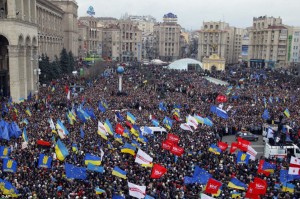 Which is why there’s a Groundhog-Day spectacle about the latest protests, which began 10 days ago, to bring down yet another Ukrainian government:
Which is why there’s a Groundhog-Day spectacle about the latest protests, which began 10 days ago, to bring down yet another Ukrainian government:
Ukrainian protesters blockaded the main government building on Monday, trying to bring down President Viktor Yanukovych with a general strike after hundreds of thousands demonstrated against his decision to abandon an EU integration pact.
Demonstrations on Saturday and Sunday, which saw violent clashes with the police, drew as many as 350,000 people, the biggest public rally in the ex-Soviet state since the ‘orange revolution’ overturned a stolen election nine years ago.
Yanukovych’s decision to abandon a trade pact with the European Union and instead seek closer economic ties with Russia has stirred deep passions in a country where many people yearn to join the European mainstream and escape Moscow’s orbit.
(Reuters, December 2, 2013)
Only God knows how this will turn out. But I would bet my life savings on Ukraine ending up in Europe; even if Russian President Vladimir Putin tries, again, to freeze it out and extort its loyalty by cutting off the gas Russia supplies – not just to Ukraine but many countries in Europe, including France and Germany.
All the same, it would not surprise me in the least if Putin does to Ukraine what he did to Georgia; namely, deploy troops to cut off the pro-Russian parts of the country….
In the meantime, I shall suffice to share excerpts from just a few of my previous commentaries, in chronological order, that should explain why Ukrainians seem caught in a vicious cycle of political unrest.
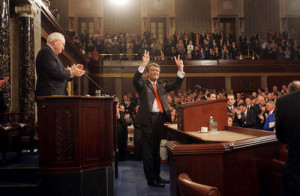 From “Viktor Yushchenko Comes to Washington,” (April 7, 2005):
From “Viktor Yushchenko Comes to Washington,” (April 7, 2005):
Yesterday, the newly elected president of Ukraine, Viktor Yushchenko, received a hero’s welcome before addressing a Joint Session of the United States Congress. Yushchenko thanked President George W. Bush for standing firm in his support for Ukraine’s peaceful Orange Revolution and vowed to build a resolutely American-style democracy in heart of the old Soviet Union.
From “Putin Fires First Salvo in New Cold War in Europe,” (January 3, 2006):
Putin made Ukrainian President Viktor Yushchenko an offer he could not refuse: Like a true dictator, Putin told Yushchenko that if Ukraine’s 47 million ‘orange revolutionaries’ wanted to continue receiving gas from Russia to cook their food, heat their homes, and drive their cars, they would have to pay four times as much. When Yushchenko refused, Putin made good on his threat and cut off the gas supply!
 [Incidentally, it should have come as no surprise when Bloomberg published a September 17, 2013 report headlined, “Vladimir Putin, the Richest Man on Earth” – with an estimated fortune of $40-60 billion. And bear in mind that he comes from peasant stock and has never held a non-government job in his life.
[Incidentally, it should have come as no surprise when Bloomberg published a September 17, 2013 report headlined, “Vladimir Putin, the Richest Man on Earth” – with an estimated fortune of $40-60 billion. And bear in mind that he comes from peasant stock and has never held a non-government job in his life.
But the reason Putin is now the richest, and arguably the most powerful, man on earth is that, in addition to using Russia’s vast oil and gas resources as political weapons, he has been using them as personal commodities to enrich himself ever since his first term as president in 2000. Most notoriously, this included confiscating the oil company of Russia’s richest man, Mikhail Khodorkovsky, and throwing him in the gulag in 2003, where he’s still rotting away to this day.]
From “Update on My Favorite Ex-Communists,” (October 2, 2007):
Only months after his election, Yushchenko’s myriad failures as a leader became so untenable that many erstwhile ‘orange revolutionaries’ (i.e., Ukrainians who risked their lives to support his call for democracy) were already pining for a return to communist rule.
In fact, Yushchenko spent so much time trying to manage the grandiose ambitions of his government ministers that he was utterly incapable of delivering on any of his election promises: most notably, to eradicate corruption, establish fiscal transparency, and set Ukraine on a path towards sustainable economic development.
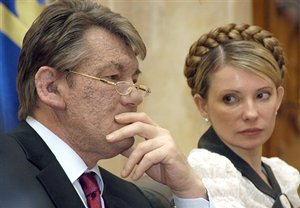 It was not surprising, therefore, that Yushchenko’s most decisive act as president was sacking Yulia Tymoshenko – the charismatic woman he appointed prime minister and who, to his understandable chagrin, many Ukrainians thought personified the spirit of the Orange Revolution.
It was not surprising, therefore, that Yushchenko’s most decisive act as president was sacking Yulia Tymoshenko – the charismatic woman he appointed prime minister and who, to his understandable chagrin, many Ukrainians thought personified the spirit of the Orange Revolution.
Unfortunately, this only deepened disaffection with his leadership and exacerbated the democratic growing pains of all Ukrainians. To make matters worse, instead of going quietly, Tymoshenko led a mutiny against him, which caused their governing coalition to crumble in abject failure.
This in turn led to new elections held in March 2006, which resulted in the improbable return to power of unreformed communists led by Viktor Yanukovych – the man Yushchenko claims headed the Russian-inspired attempt to assassinate him.
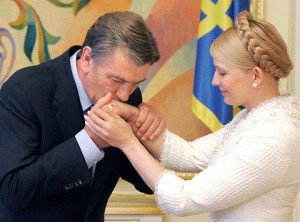 From “Update on My Favorite Ex-Communists,” (September 24, 2008):
From “Update on My Favorite Ex-Communists,” (September 24, 2008):
There were great expectations last year that the gunshot re-marriage between President Viktor Yushchenko and Prime Minister Yulia Tymoshenko, the two leaders of Ukraine’s democratic forces, would last. But I was more cynical. In fact, despite writing that ‘perhaps this third time will prove a charm,’ I ended last year’s update as follows:
‘Chances are even better, however, that I’ll be writing a similar update a year from now after another round of elections are called to end yet another period of political deadlock….’
And, sure enough, here I am.
It is noteworthy, however, that this third divorce was caused by far more than persistent irreconcilable differences between Yushchenko and Tymoshenko. Because it was triggered by Tymoshenko’s refusal to stand by Yushchenko when he went out on a limb in June to support another ex-communist, Georgian President Mikhail Saakashvili, in his failed attempt to oust Russian forces from his country.
Yushchenko claims that Tymoshenko not only betrayed him (and Ukraine’s democratic forces) but was actually plotting ‘a political and constitutional coup d’etat’ by joining Viktor Yanukovych, the leader of Ukraine’s pro-Russian party, in accusing Georgia’s democratic forces of provoking the Russian invasion.
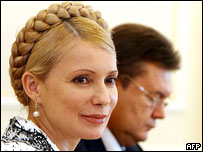 From “Alas, Most Ukrainians Believe in Constant Change, if Not in Chaos,” (March 4, 2010):
From “Alas, Most Ukrainians Believe in Constant Change, if Not in Chaos,” (March 4, 2010):
Well, it’s little more than a year, but this latest update brings more of the same. Because, after joining forces to utterly frustrate Yushchenko’s presidency, Tymoshenko and Yanukovych immediately began plotting against each other to replace him.
This led to new presidential elections last month, which resulted in Yanukovych defeating Tymoshenko. Yet, true to form, this latest change has only ushered in a new term of political chaos and dysfunction.
In this case, just as she defied Yushchenko, Tymoshenko defied Yanukovych’s demands for her to resign as prime minister so that he could appoint someone whose sole ambition was not to take his job…
This means that Ukraine is probably in for another round of snap parliamentary elections before summer. And so it goes….
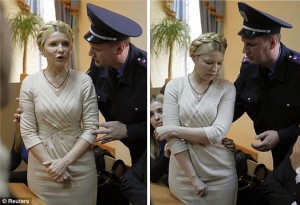 From “Rise and Fall of Ukraine’s Yulia Tymoshenko,” (October 14, 2011):
From “Rise and Fall of Ukraine’s Yulia Tymoshenko,” (October 14, 2011):
A judge sentenced former Prime Minister Yulia Tymoshenko to seven years in prison for abusing her powers, by signing a sweetheart oil deal with Russia, while in office. And to compound her woes, the state security service filed additional corruption charges against her only yesterday, claiming that she misappropriated over $400 million from the government’s budget to pay off a debt owed to Russia by an energy company she once ran…
Tymoshenko denies everything of course, claiming that she’s being persecuted for her political beliefs by Ukraine’s unrepentant communist president, Viktor Yanukovych. Whatever the case, these new charges mean that she could end up spending the rest of her life in prison.
Mind you, such a fate would be entirely in keeping with the Joan-of-Arc persona she has cultivated over the years. And she will doubtless spin her imprisonment as martyrdom for the noble cause of Ukrainian democracy, which she and her fellow Orange Revolutionaries were mandated to usher in six years ago.
Never mind that all of her former political partners would probably describe her as more of a cross between Mata Hari and the Black Widow; and that her imprisonment is her just deserts…
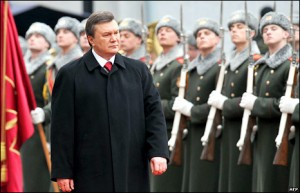 Clearly, when all is said and done, Tymoshenko is learning the hard way that the difference between a democratic president like Yushchenko and a communist one like Yanukovych is that the former just fires public servants who refuse to carry out his political agenda; the latter throws them in prison.
Clearly, when all is said and done, Tymoshenko is learning the hard way that the difference between a democratic president like Yushchenko and a communist one like Yanukovych is that the former just fires public servants who refuse to carry out his political agenda; the latter throws them in prison.
This brings us full circle – with former Orange Revolutionaries fighting to overthrow the pro-Russian Yanukovych once again.
‘Our plan is clear: It’s not a demonstration; it’s not a reaction; it’s a revolution,’ said Yuriy Lutsenko, a former interior minister who is now an opposition leader.
(The Associated Press, December 1, 2013)
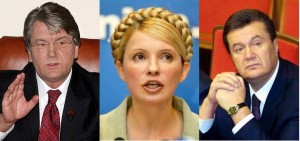 Never one to be sidelined during a national fight, Tymoshenko went on a hunger strike in solidarity with these anti-government protesters. She’s in her eighth day and is probably wondering why the international media are spending more time covering their protests than her strike.
Never one to be sidelined during a national fight, Tymoshenko went on a hunger strike in solidarity with these anti-government protesters. She’s in her eighth day and is probably wondering why the international media are spending more time covering their protests than her strike.
For his part, Yushchenko led negotiations with European leaders to formulate terms for Ukraine’s Association Agreement with Europe, which Yanukovych balked at signing at the eleventh hour (showing himself more fearful of Russia’s cold shoulder than solicitous of Europe’s warm embrace).
Thus continues the political triangle among these three, which has only reinforced Ukraine’s reputation as being either a Russian lapdog or an ungovernable mess ever since its disassociation from the Soviet Union in 1991.
_____________________
Given that background, here’s what I think about the latest:
Pro-Western Ukrainians are establishing (through “blood, toil, tears, and sweat”) the plainly untenable precedent that, if enough people are upset about a wholly legal government initiative, they can:
- march on the nation’s capital and turn it into a mass political mosh pit;
- build a warlike garrison in response to government entreaties to evacuate in the interest of the general welfare;
- prevent duly elected politicians from conducting any government business;
- refuse all government offers to compromise, including invitations to join a government of national unity and proposals for new elections to have the initiative at issue ratified or rejected by democratic means;
- retaliate in kind when police resort to force to evict them;
- storm government buildings (in ways, forgive the mixed allusions, reminiscent of the “storming of the Bastille”) when government shows unwillingness to use military means to evict them (in ways reminiscent of the Chinese government evicting protesters from Tiananmen Square); and
- force a democratically elected president to flee for his life.
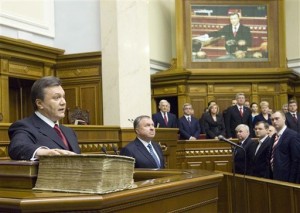 Remember, as politically loathsome as Yanukovych might be, he was elected president in free and fair elections. Which is why it reeks of political hypocrisy and opportunism for Western leaders, most notably President Obama, to be voicing support for this de facto coup, no matter how popular, instead of condemning it.
Remember, as politically loathsome as Yanukovych might be, he was elected president in free and fair elections. Which is why it reeks of political hypocrisy and opportunism for Western leaders, most notably President Obama, to be voicing support for this de facto coup, no matter how popular, instead of condemning it.
After all, this is the equivalent of millions of Republicans – who oppose Obamacare – amassing in Washington, DC and behaving in similar fashion in a misguided attempt to force Obama to repeal the law. Frankly, supporting these Ukrainian protesters is just encouraging this kind of mob rule, which is so anathema to democracy and the rule of law.
Not to mention that there’s a critical mass of pro-Russian Ukrainians in the East of the country (most notably in the Crimea region) who strongly supported Yanukovych’s initiative to form closer ties with Russia. Granted, Russia’s $15 billion inducement probably softened a few hearts.
And it hardly bodes well for national unity in Ukraine that the pro-Western parliament is now calling not only for closer ties with Europe but also for Yanukovych’s arrest on charges of mass murder.
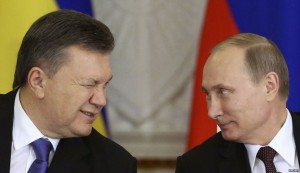 Indeed, bear in mind that the country was virtually split down the middle at the last election in 2010 – with those in the West voting for Tymoshenko and closer ties with Europe (and the United States), those in the East for Yanukovych and closer ties with Russia. Yanukovych won. Therefore, despite open and notorious flirtation with European leaders, it should have come as no surprise that he ultimately got into bed with Vladimir Putin, who clearly fancies himself the de facto leader of a Soviet Union that, in his mind, never died.
Indeed, bear in mind that the country was virtually split down the middle at the last election in 2010 – with those in the West voting for Tymoshenko and closer ties with Europe (and the United States), those in the East for Yanukovych and closer ties with Russia. Yanukovych won. Therefore, despite open and notorious flirtation with European leaders, it should have come as no surprise that he ultimately got into bed with Vladimir Putin, who clearly fancies himself the de facto leader of a Soviet Union that, in his mind, never died.
But what if Tymoshenko had won and got into bed with … Obama, which in turn incited pro-Russian Ukrainians to do to her what pro-Western Ukrainians are doing to Yanukovych? Do you think Western leaders would be voicing their support?
Incidentally, I readily concede that my simplified references to pro-Western and pro-Russian Ukrainians overlook the fact that this schism is as much generational as it is geographical — with older Ukrainians, East and West, retaining greater affinity for Mother Russia based on nostalgia for the former Soviet Union they knew so well; and younger Ukrainians, East and West, displaying greater interest in Western assimilation based on, well, their hope for a more progressive, democratic future.
The far more important and pivotal question, though, is: What will Putin do? Not least because it would make a mockery of the Cold-War principles he governs by if Putin allows these Ukrainian revolutionaries to put his puppet Yanukovych on trial – the way Egyptian revolutionaries are doing with their former leaders Hosni Mubarak and Mohamed Morsi; or worse, if he allows them to execute Yanukovych in the streets like a bunch of hungry hyenas devouring a gazelle – the way Libyan revolutionaries did with Muammar Gaddafi.
After all, Putin has made no secret of his contempt for what he decried as Obama’s failure to protect America’s puppet leader, Mubarak, from avenging mobs.
Let me hasten to clarify, however, that Putin’s contempt was and remains entirely self-interested. For example, he makes quite a show of standing in solidarity with despots like Ben Ali of Tunisia, Yanukovych of Ukraine, and Assad of Syria. But he does so only because he lives in mortal fear of popular uprisings of the sort that toppled them toppling him too. Period.
This is why he must’ve been a little unnerved yesterday when even pro-Russian Ukrainians began calling for Yanukovych’s head. This, after they got a glimpse at the obscenely opulent, Louis-XVI lifestyle he was living at their expense. So just imagine what Putin’s peasant supporters in Russia would want to do to him. After all, he lives a lifestyle that’s a thousand times more extravagant than Yanukovych’s, having amassed billions in ill-gotten gains over the years as a KGB officer turn politician.
After eight years in power, Putin has secretly accumulated a fortune of more than $40bn. The sum would make him Russia’s (and Europe’s) richest man.
(“Putin, the Kremlin Power Struggle and the $40bn Fortune”, The London Guardian, December 21, 2007)
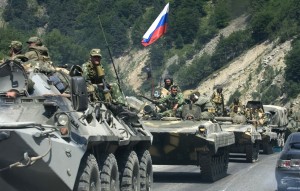 Trust me, Putin lords over a kleptocracy that has fleeced public funds on such an unprecedented scale, it makes kleptocracies African despots lord over seem petty. Which of course is why he is so anxious to stoke the combustible geopolitical crisis in Ukraine to deflect the international media from drawing unavoidable parallels between Yanukovych’s dubious accumulation of wealth and his. Far better, for example, to get Russians drunk with pan-Russian pride than to have them pose sober questions about the billions he and his cronies embezzled from the $50-billion price tag for the Sochi Olympics.
Trust me, Putin lords over a kleptocracy that has fleeced public funds on such an unprecedented scale, it makes kleptocracies African despots lord over seem petty. Which of course is why he is so anxious to stoke the combustible geopolitical crisis in Ukraine to deflect the international media from drawing unavoidable parallels between Yanukovych’s dubious accumulation of wealth and his. Far better, for example, to get Russians drunk with pan-Russian pride than to have them pose sober questions about the billions he and his cronies embezzled from the $50-billion price tag for the Sochi Olympics.
But this crisis demonstrates that the value of a nation’s character is being measured these days by the extent to which its citizens will go to get rid of a corrupt leader. Therefore, Russians must count their nationalism cheap when they see that their Ukrainian counterparts risked (and, in many cases, sacrificed) their lives to get rid of their corrupt leader—who, compared to Putin, was a veritable Honest Abe….
More to the point, though, most political pundits appear to have forgotten that the imperial “Czar” Putin has established his own precedent for dealing with former Republics of the former Soviet Union that turn their backs on Russia to embrace closer ties with the West. Hint: it involves Russian troops.
Specifically, here are a few instructive excerpts from commentaries I’ve written on what I call the Georgia precedent:
- From “Tensions Simmering Between Mother Russia and Her Former Dependent Territory, Georgia,” (June 6, 2008):
To be fair to Putin, he has just as much moral authority (and military power) to do what he’s doing in Georgia as President Bush had to do what he did in Kosovo (i.e., to use force to facilitate independence for a province [or in this case two provinces] within an independent state).
- From “Russia Invades Georgia Under Cover of Beijing Olympics,” (August 8, 2008):
Georgia calling on the United States and Europe to come to its aid is rather like the tiny Caribbean country of Grenada calling on the Soviet Union to come to its aid after the United States invaded in 1983.
- From “With Mission Accomplished in Georgia, Putin Orders Ceasefire,” (August 13, 2008):
Western leaders have responded with nothing more than hollow words to Georgian President Mikhail Saakashvili’s cries for help in repelling the Russian invasion of his country… And no one knew this would be the case more than Russian Prime Minister Vladimir Putin. That is why he made this Clausewitzian move to invade and occupy almost half of Georgia while engaging Western leaders in a diversionary war of words…
Putin’s message to Georgia and other former Republics of the former Soviet Union (like Ukraine) is crystal clear: If you think you’re so far beyond Russia’s Cold-War sphere of influence that you can rub your political and military alliances with the West in our face, think again!
Accordingly, I predict that it’s only a matter of time before these two (de facto independent) provinces [namely South Ossetia and Abkhazia] formally reunite with their Mother Russia.
In fact, to this day the pro-Russian provinces of South Ossetia and Abkhazia remain more Russian than Georgian. And it hardly matters that only Russia and a few anti-American states like Venezuela and Nicaragua recognize them as independent states.
On Monday the Russian President sent addresses to Abkhazian President Alexander Ankvab and South Ossetian President Leonid Tibilov. In the messages the Russian leader wrote that the decision to support the two nations’ struggle for independence, made in 2008, was not easy but it was the only right option. Such a move was crucial for the young states because it allowed them to take independent decisions on their future, Vladimir Putin added in his message.
(Russia Today [RT], August 26, 2013)
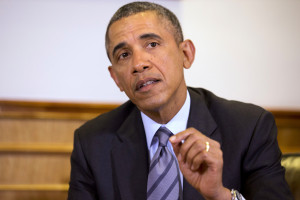 Therefore, bear this Georgia precedent in mind when you hear Obama warning that it would be a “grave mistake” for Putin to order Russian troops to invade and occupy pro-Russian provinces in Ukraine.
Therefore, bear this Georgia precedent in mind when you hear Obama warning that it would be a “grave mistake” for Putin to order Russian troops to invade and occupy pro-Russian provinces in Ukraine.
And Ukraine’s pro-Russian province of Crimea might just be where the rubber hits the road. Because Crimea is not only where Yanukovych is reportedly hiding out, but also where Putin is hearing South Ossetian and Abkhazian-like cries from people for Mother Russia to rescue them from their fascistic pro-Western brothers and sisters.
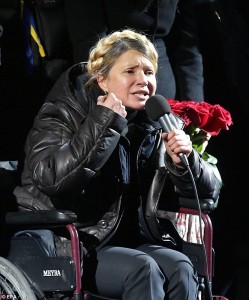 In the meantime, I have no reason to believe that the pro-Western revolutionaries who ousted the pro-Russian Yanukovych last week will be any more capable of governing Ukraine than the pro-Western revolutionaries who ousted this same pro-Russian Yanukovych 10 years ago.
In the meantime, I have no reason to believe that the pro-Western revolutionaries who ousted the pro-Russian Yanukovych last week will be any more capable of governing Ukraine than the pro-Western revolutionaries who ousted this same pro-Russian Yanukovych 10 years ago.
This is especially so given the return to Ukrainian politics of the perennial femme fatale Tymoshenko – who the new parliament ordered to be released from prison last week with the same revolutionary exuberance with which it ordered her fleeing nemesis, Yanukovych, to be arrested:
Yulia Tymoshenko has a record allegedly as shady as any politician’s in Ukraine, and that’s saying something…
Don’t let her looks fool you. The woman of the moment in Ukraine, whose crown of braided golden hair is calculated to evoke mythical memories of rural strength, has always been a better icon than a politician.
(Daily Beast, February 24, 2014)
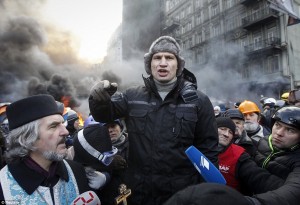 In any event, parliament has scheduled new presidential elections for May 25. But, as I delineated in previous commentaries, and as the Daily Beast echoed yesterday, it behooves new revolutionaries, like former heavy boxing champion Vitali Klitschko, to be wary of establishing common cause with a self-righteous political black widow like Tymoshenko. Because unless they do her bidding, including allowing her to stand as their candidate for president by acclamation, she will sabotage their efforts to govern just as she sabotaged those of the father of Ukraine’s Orange Revolution, Viktor Yushchenko, and those of his successor, the fugitive Viktor Yanukovych.
In any event, parliament has scheduled new presidential elections for May 25. But, as I delineated in previous commentaries, and as the Daily Beast echoed yesterday, it behooves new revolutionaries, like former heavy boxing champion Vitali Klitschko, to be wary of establishing common cause with a self-righteous political black widow like Tymoshenko. Because unless they do her bidding, including allowing her to stand as their candidate for president by acclamation, she will sabotage their efforts to govern just as she sabotaged those of the father of Ukraine’s Orange Revolution, Viktor Yushchenko, and those of his successor, the fugitive Viktor Yanukovych.
By the same token, however, it behooves the United States and other Western countries to be every bit as wary of supporting the fractious opposition forces (which include neo-Nazi nationalists) who got rid of Yanukovych in Ukraine as they are of supporting the fractious opposing forces (which include al-Qaeda jihadists) who are trying to get rid of Assad in Syria.
Stay tuned.
Related commentaries:
Rise and fall of Tymoshenko…
